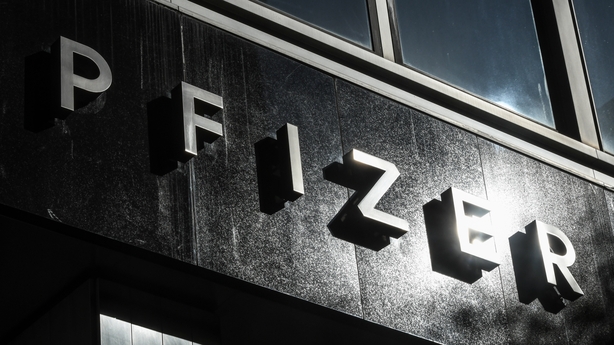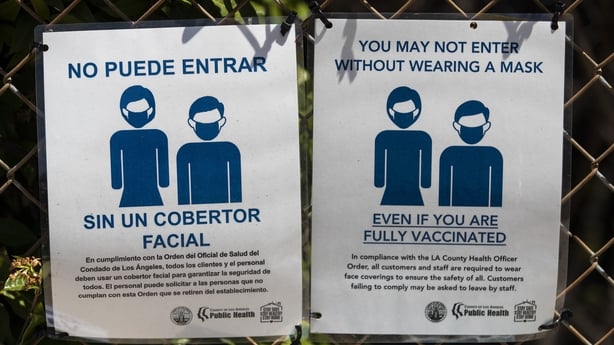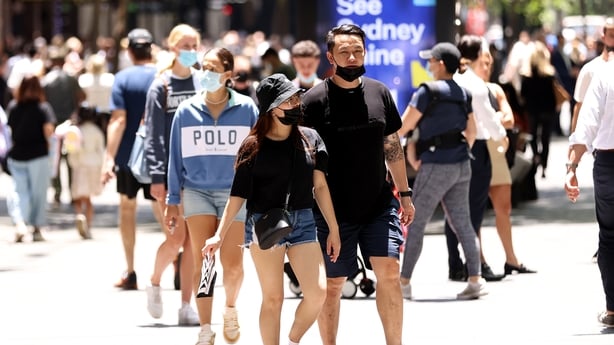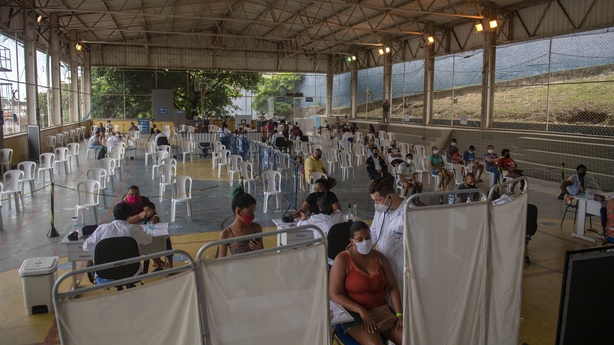The World Health Organization has warned that the new coronavirus variant Omicron was spreading at an unprecedented rate and was likely already present in most countries around the world.
Since the new, heavily mutated variant was first detected in southern Africa last month, it has been reported in 77 countries, WHO chief Tedros Adhanom Ghebreyesus told reporters.
But, he stressed, "the reality is that Omicron is probably in most countries, even if it hasn't been detected yet".
"Omicron is spreading at a rate we have not seen with any previous variant," he said.
His comments came amid growing evidence that the new variant might also be better at skirting vaccine protections than previous ones, but could cause milder symptoms.
But Mr Tedros cautioned against "dismissing Omicron as mild".
"Surely, we have learned by now that we underestimate this virus at our peril," he said.
"Even if Omicron does cause less severe disease, the sheer number of cases could once again overwhelm unprepared health systems."
The WHO chief also voiced concern that many countries are rushing to provide booster vaccine doses in response to the spread of Omicron, in light of the persistent glaring inequity in vaccine access between wealthy and poorer countries.
"WHO is concerned that such programmes will repeat the Covid-19 vaccine hoarding" seen previously this year, he said.
He said there was not yet enough data to show a third dose is needed to effectively protect healthy adults against the variant, although he said that "as we move forward, boosters could play an important role".
At the same time many vulnerable people in poorer countries have not yet received a single dose.
"Let me be very clear: WHO is not against boosters. We're against inequity. Our main concern is to save lives everywhere," Mr Tedros said.
"It's a question of prioritisation," he said.
Africa sees 83% surge in Covid-19 cases in past week
Meanwhile, Africa is experiencing its fastest surge in Covid-19 cases this year, with the number up 83% in the past week, although deaths remain low, the WHO said earlier today.
The spike in cases is driven by the Delta and Omicron variants, the WHO said in a statement. The number of new Covid-19 cases on the continent is currently doubling every five days, the shortest time frame reported this year.
Africa's low inoculation rates have encouraged viral mutations like the new Omicron variant to spread, according to health experts. The continent struggled to obtain vaccine doses until recently, and is facing challenges to distribute them including lack of funds, staff and equipment.
As of yesterday, only 20 African countries had vaccinated at least 10% of their population, according to the WHO. Some countries, like Democratic Republic of Congo and Chad, have vaccinated less than 1%, data collected by Reuters shows.
"We are cautiously optimistic that deaths and severe illness will remain low in the current wave, but slow vaccine roll-out in Africa means both will be much higher than they should be," said Dr Matshidiso Moeti, WHO Regional Director for Africa.
Africa recorded more than 196,000 new cases for the week ending on 12 December, up from around 107,000 the previous week, the WHO said. Deaths dropped by 19% in the same period, it said, and have averaged about 1,000 per week in the fourth pandemic wave.
At the current pace, it will take until May 2022 before Africa reaches 40% vaccination coverage and August 2024 before it reaches 70%, the WHO said.
Pfizer says study confirms positive results for anti-Covid pill

Pfizer has said that clinical trials confirmed its anti-Covid pill reduced hospitalisations and deaths among at-risk people by almost 90% when it was taken in the first few days after symptoms appear.
The results are based on trials of more than 2,200 people and back-up findings announced last month from preliminary trials. The company also said the treatment appears to be effective against the Omicron variant.
"This news provides further corroboration that our oral antiviral candidate, if authorised or approved, could have a meaningful impact on the lives of many," Pfizer CEO Albert Bourla said in a statement, adding the new drug, called Paxlovid, could "save lives."
The trial showed that the pill reduced the need for hospitalisation in high-risk adults with Covid-19 by 89% if the treatment was given within three days of symptom onset and by 88% if given within 5 days, according to the company.
Lab data also shows that the pill will be also effective in treating people infected with the Omicron variant, according to Pfizer's statement.
California reintroduces indoor mask mandate

Authorities in California said they were reinstating mask mandates in all indoor public spaces to try to curb the resurgence of Covid-19 in recent weeks.
The mask mandate, which will come into force Wednesday, applies to all individuals, whether vaccinated or not.
Los Angeles, San Francisco and other counties in California reintroduced the mask-wearing rule locally several months ago.
But other counties, such as Orange and San Diego, which are very heavily populated, had stuck with state-wide rules that masks only needed to be worn in certain public spaces such as airports, hospitals or schools but not in shops, restaurants or cinemas.
California's Health Secretary Mark Ghaly said the rapid rise in Covid-19 cases had prompted the new rule.
There has been a 47% increase in cases since the Thanksgiving holiday at the end of November.
The number of new daily cases of coronavirus in California has risen from 9.6 per 100,000 to 14 per 100,000 during that time.
Mr Ghaly said that wearing a mask could help prevent a repeat of last winter's high rates of infection and death.
"This is a critical time where we have a tool that we know has worked and can work," he said.
"As we look at the evidence that masks do make a difference, even a 10% increase in indoor masking can reduce case transmission significantly."
The mask mandate will remain in place until 15 January.
California has also clamped down on unvaccinated people wishing to attend gatherings of more than 1,000 people in an enclosed space.
Unvaccinated attendees will have to provide a negative Covid-19 test taken less than 24 or 48 hours (depending on the type of test) earlier, as opposed to 72 hours previously.
California's announcement came the same day that similar restrictions were imposed in New York City.
Australia sticks with easing plans as virus cases jump
Australia will push ahead with plans to ease Covid restrictions before Christmas, officials said, even as new coronavirus cases in the country's most populous state reached a ten-week high.
After a string of infections linked to festive season parties in and around Sydney, New South Wales state recorded more than 800 new cases yesterday - its highest total since 2 October.
There were seven related deaths reported nationwide.
Authorities said the new cases would not deter them from dropping most public mask-wearing requirements from tomorrow or lifting a ban on unvaccinated citizens entering restaurants, bars and major events.
"We have decided as a country to live with this virus," said Prime Minister Scott Morrison, touting high vaccination rates as a guarantee of a virtually restriction-free festive period.
"This Christmas, we're about to have is a gift Australians have given to themselves, by the way they've worked together with the settings we've put in place," he said.
After a glacial initial vaccine roll-out, more than 89% of Australians aged over 16 are now double-dose vaccinated and 93% have received their first jab.

The gap required before a third-dose booster can be administered has been shortened from six months after the second jab to five months to provide better resistance.
Australia has also detected more than 85 cases of the Omicron variant, which is feared to be highly transmissible and more vaccine resistant.
New South Wales health minister Brad Hazzard said he was "very concerned" not enough people were getting a booster shot, but pledged not to introduce any snap lockdowns.
"My concern is that once the unvaccinated are mixing in with the vaccinated, you'd have to expect the numbers will increase even further and that's worrying because that puts pressure on our doctors and our nurses and our frontline health system," Mr Hazzard said.
Adding to the pressure, Australia is ploughing ahead with reopening domestic and international borders, welcoming back vaccinated skilled migrants and students from tomorrow.
Australia has recorded more than 230,000 cases of Covid-19 and 2,113 related deaths in a population of 25 million since the pandemic began.
Brazil requires Covid-19 vaccination for arriving travellers
Brazil has begun requiring a Covid-19 vaccination certificate for foreign travellers arriving in the country, a move initially blocked by President Jair Bolsonaro's government.
A Supreme Court justice ruled on Saturday that proof of vaccination would be mandatory to enter Brazil, in an effort to slow the spread of the Omicron coronavirus variant.
The national health regulator Anvisa said it had "notified this Monday the border posts, especially at airports, about the immediate compliance with the decision of the Supreme Federal Court that determines the requirement of the vaccination certificate for travellers entering the country".
The nine other high court justices must confirm the ruling between Wednesday and Thursday, but Anvisa said the decision had already gone into effect.
"The (court) decision has immediate effect ... and, therefore, requires the agency to carry out timely assessments, especially in relation to passengers who were already moving or in transit at the time the decision was issued," Anvisa said in its statement.

Brazil last week had initially ruled out requiring a vaccination certificate, despite a recommendation from Anvisa in the face of recorded Omicron cases in the country.
The move came after far-right president Mr Bolsonaro compared such a mandate to a "leash" for animals.
Health Minister Marcelo Queiroga said Brazil would instead require a five-day quarantine for unvaccinated travellers, a measure also recommended by the health regulator.
The quarantine rule will go into effect on 18 December.
The debate over vaccination certificates has been growing between the Brazilian government, scientists and local authorities, as the country has recorded at least 11 cases of the Omicron strain and expects higher rates of tourists during the winter holidays.
Brazil has suffered more than 616,000 Covid-19 deaths since the start of the pandemic, second only to the US in absolute numbers.

